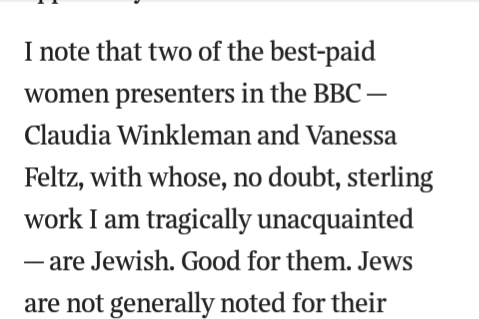
Good morning Britain!
I see you’ve met Kevin Myers, Ireland's top *controversial* columnist in a crowded field.
The Sunday Times Irish edition this morning published a column by Myers that took aim at the BBC's gender pay gap row. Being a controversialist, which these days means echoing a golf-club bore several gins over the driving limit, Myers has decided that women at the BBC don’t get paid as much as men because they don’t deserve it. Men, you see, “usually work harder, get sick less frequently and seldom get pregnant”. They “tend to be more ambitious: they have that greyback testosterone-powered, hierarchy-climbing id that feminised and egalitarian-obsessed legislatures are increasingly trying to legislate against.” (“Yes, Mr Myers. Should I call you a cab maybe?”, you can hear the callow young clubhouse bar man, half suggesting, half pleading).
Controversial enough for you? No? The bore is losing the bar, so to speak, so he reaches for more: “I note that two of the best-paid women presenters in the BBC – Claudia Winkleman and Vanessa Feltz, with whose, no doubt, sterling work, I am tragically unacquainted – are Jewish,” (he scans the bar: are they ready for the killer line?). “Good for them. Jews are not generally noted for their insistence on selling their talent for the lowest possible price...”, he delivers his line with a man-of-the-world nod, before demanding another gin, and a packet of peanuts, all hope he’d be in a cab and comatose by 8.30 lost.
I’m not, to be clear, suggesting that Myers drinks, or drank while writing this column. I have no idea of his habits and I care less. But what we have here is a particular style of conservative contrarian. It is not the tight-lipped fury of a Melanie Philips, or the nostalgic despair of a Peter Hitchens. It is more a lazy lashing out, combined with an entirely unjustified intellectual arrogance.
I can already hear Myers’ justification of his comments. He (unlike those who criticise him) has traveled the world and met people of all different faiths and none. He has many Jewish friends and acquaintances. And in fact, most of them are well off, and prudent with money. And since when was saying a group was financially savvy an insult anyway? Perhaps the spendthrift Irish could learn something from the Jews.
This will all come couched in a truth-to-power spiel. And he’ll probably “point out” that it's ironic that those in Irish society decrying his “supposed anti-Semitism” have never had a good word to say about the state of Israel.
Myers has form, if not necessarily in anti-Semitism, then certainly in dreary controversy. I recall a column at the height of the expositions about institutional child abuse in Ireland, claiming that beatings at his British public school never did him any harm. Back in 2005, there was controversy when he used the Irish Times* Irishman’s Diary column (now brilliantly stewarded by Frank McNally) to have a go at children and their mothers. “And how many girls – and we're largely talking about teenagers here – consciously embark upon a career of mothering bastards because it seems a good way of getting money and accommodation from the State? Ah. You didn't like the term bastard? No, I didn't think you would. In the welfare-land of Euphemesia, what is the correct term for the offspring of unmarried mothers? One-parent offspring?”
How brave, Kevin. Look at you, standing up to those politically correct Stalinist commissars. And children.
Myers eventually apologised for that one. He might eventually apologise for this one too.
But for those who are asking this morning how Myers comments about Jews got past the editors, it's worth reading Geraldine Kennedy, the Irish Times editor who published the “bastards” column in 2005. Kennedy noted the role of the controversialist in a paper:
“Kevin performs a very important function in this newspaper by challenging many of today's orthodoxies in the same spirit as The Irish Times has always questioned the prevailing views of the day. It is part of this newspaper's role to challenge and question, to provide a forum for debate, and to give a platform to minority, sometimes unpopular, views.”
Kennedy claimed that Myers article showed “The mindset which sees innocent children as bastards still exists in 2005, unfortunately, and I felt it should be revealed." But she then went on to say that she regretted the publication of the column and apologised "for the offence caused to hundreds of women and children, to many readers of this newspaper.”
This is the problem when someone is hired *in order* to be controversial. Inevitably, the controversialist will go too far beyond most people deem acceptable: it is quite simply the nature of the job. And with that, everyone involved in putting the paper together has the same problem. From subeditor to editor, every week the call must be made on whether the resident controversialist has been not controversial enough, too controversial, or just-the-right-amount of controversial.
There will be an inquiry today as to how this piece got through, and judgment will be called into question. The article already appears to have been pulled from the online edition of the Sunday Times Irish edition. But these things (see also Katie Hopkins’ cockroach comments among many others) will keep happening as long as we continue to conflate genuinely provocative writing with tedious shockmonging.
To return to the bar bore analogy, I will never forget an old man in a pub many years ago, walking up to drinkers hoping for a quiet pint, announcing aggressively: “I'ma fascist. What do you think of that?”
Now imagine if that was your job.
*To be 100 per cent clear to UK readers who may not know, the Irish Times and the Sunday Times Irish edition are wholly separate entities.
An earlier version of this article stated that Flann O’Brien wrote An Irishman's Diary for th Irish Times. O'Brien's column was an Cruiskeen Lawm. not An Irishman’s Diary.